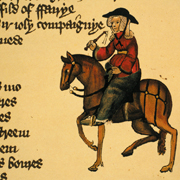| |
Comment on this article
The War Between the Sexes, in the Middle Ages
Not everyone believed the “Book of Wikked Wyves.”
November/December 2012
Photograph ©Bridgeman Art Library
How misogynistic were Englishmen in the Middle Ages? Not as much as you might think. A retired Yale Chaucer scholar is bringing to
press several medieval tracts by men about women—and while some pass harsh
judgment, others deliver surprisingly spirited defenses.
| |

In the Canterbury Tales, the Wife of Bath
describes her husband’s collection of misogynistic screeds. It turns out to
have been based in reality.
|
The book, due out in 2013, will be the second volume
of Jankyn’s Book of Wikked Wives (University of Georgia Press). Both the
title and the research were inspired by Chaucer. In the Canterbury Tales, the
Wife of Bath says that Jankyn, her fifth husband, used to read to her nightly
from his “Book of Wikked Wyves”—a collection of misogynistic screeds about
wives who made their husbands’ lives miserable. The 2013 book will be the
culmination of 80 years of on-again, off-again investigation into Jankyn’s
(fictional) book and the real collections Chaucer based it on. Yale Chaucerian
Karl Young began the project in the 1930s, and his student, Robert Pratt ’29,
’33PhD, continued it. Traugott Lawler, professor emeritus of English, and Ralph
Hanna ’66PhD, now at Oxford, took over the project from Pratt in 1981. It is
their work that will soon be published.
By combing through English libraries, Young and Pratt
found a number of ancient “books of wikked wyves,” that is, collections of
writings that criticize women and warn men against marriage. Their discoveries
make it clear that although much of Jankyn’s book is “Chaucer’s fantastic
idea,” says Lawler, “such collections actually existed.” The main text in these
collections—and Jankyn’s favorite—is the Dissuasio Valerii, a witty attempt
by a character named Valerius to dissuade a friend from marrying. (Young and
Pratt began the work of preparing the Dissuasio for print, along with the other main texts mentioned by the Wife of Bath.
Lawler and Hanna completed it for the first volume of Jankyn’s Book,
published in 1997.)
The actual author of the Dissuasio was Walter
Map, a late-twelfth-century cleric and courtier. Map was a satirist, and his
disparagement of women and matrimony, says Lawler, was “largely tongue in
cheek.” But readers took the book seriously: it was taught in schools and
became the subject of learned commentaries. Young and Pratt uncovered these
commentaries, seven in all, and Lawler and Hanna have now edited and translated
them for print.
Interestingly, none of the commentators caught Map’s
irony. Four of them take him at his word, but three treat his advice as “a dangerous
text to be refuted,” Lawler says; they insist that marriage is good and women
are good. That gives them a significance beyond Chaucer scholarship, he notes.
“These three precious texts offer vigorous defenses of women,” and are
therefore “significant new voices from the medieval world arguing for common
sense in the relationship between the sexes.”  |
|


